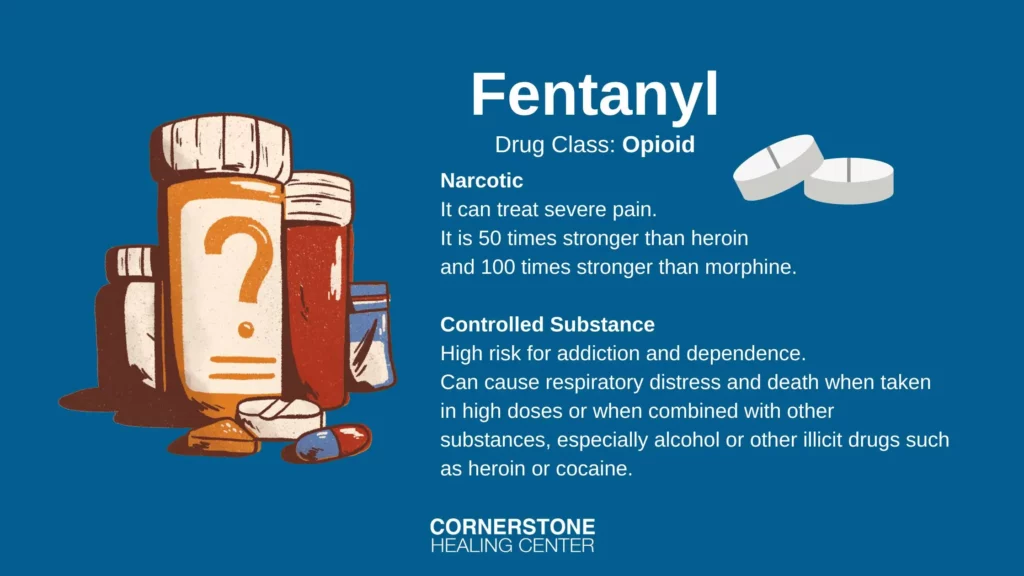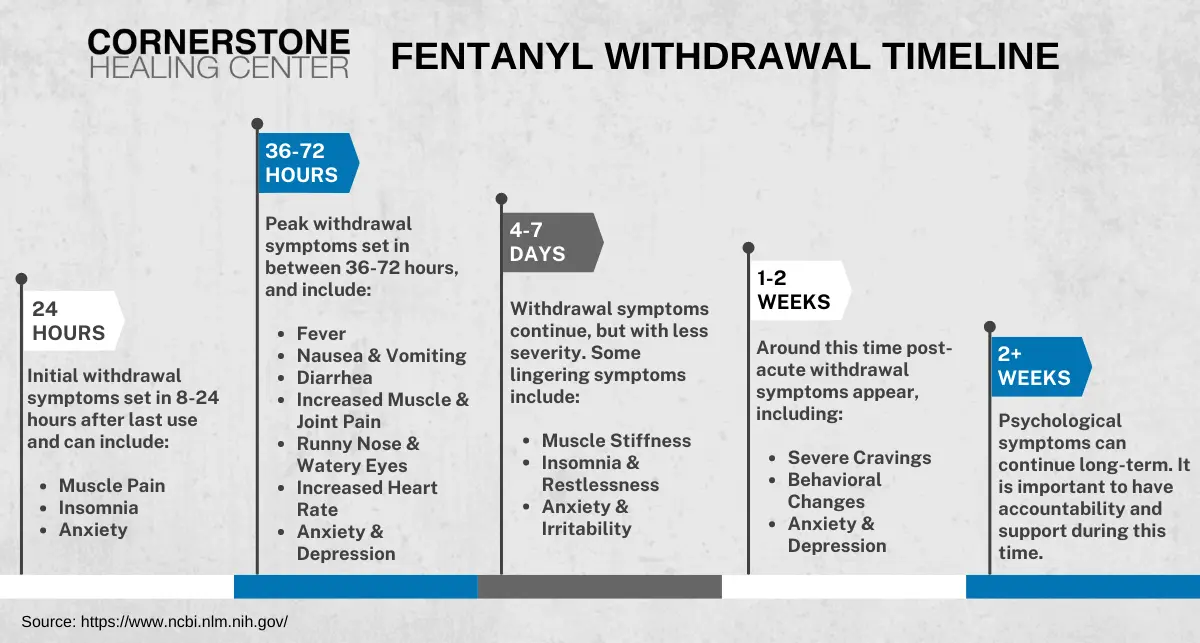Fentanyl is a synthetic opioid that is widely used for pain relief in medical settings due to its potent analgesic properties.
However, its potency also brings significant risks, particularly in the form of withdrawal symptoms that occur when its use is reduced or discontinued.
This article aims to provide a complete understanding of Fentanyl withdrawal, highlighting its symptoms, management strategies, and the importance of preventive measures and education.

Understanding Fentanyl Withdrawal
Fentanyl withdrawal encompasses the physical and psychological symptoms that emerge when an individual who has been regularly using Fentanyl, either medically or recreationally, abruptly decreases or stops its use. The scope of Fentanyl withdrawal is extensive, as it affects various body systems, leading to a range of symptoms that can be distressing and challenging to manage. Unlike withdrawal from other opioids, Fentanyl withdrawal is particularly intense due to the drug’s high potency and rapid action. The withdrawal symptoms of Fentanyl users are more severe and faster than those of other opioids. This difference is primarily due to Fentanyl’s unique pharmacological properties, which create a more profound physical dependence. Understanding these distinctions is crucial for effectively managing Fentanyl detox and supporting individuals through the withdrawal process, acknowledging the heightened intensity and rapid onset of symptoms unique to Fentanyl.
Onset and Duration of Fentanyl Withdrawal Symptoms
- The onset and duration of Fentanyl withdrawal symptoms can vary depending on several factors, including the duration of Fentanyl use, the dosage, and individual physiological differences.
- Typically, symptoms begin to appear within 12 to 30 hours after the last use of Fentanyl. 1
This relatively quick onset is due to Fentanyl’s short half-life compared to other opioids.
- The acute phase of Fentanyl withdrawal, characterized by the most intense symptoms, usually peaks around 2 to 3 days after cessation and can last for a few weeks to even a month.
- Individuals may experience the most severe physical and psychological symptoms during this time.
Following this, symptoms gradually begin to decrease in intensity.
- However, some individuals may experience protracted withdrawal symptoms, known as Post-Acute Withdrawal Syndrome (PAWS). 2
- These symptoms can include mood swings, anxiety, sleep disturbances, and ongoing cravings.
- PAWS can last for weeks or even months, though the intensity is typically much less than during the acute phase.
It’s critical for individuals undergoing Fentanyl withdrawal to be monitored and supported throughout this period, as the severity and duration of symptoms can vary significantly from person to person.
Physical and Psychological Symptoms of Fentanyl Withdrawal
Fentanyl withdrawal manifests in a range of physical and psychological symptoms that can significantly impact an individual’s well-being.
Here are some common symptoms one would experience when withdrawing from Fentanyl3
| Physical Symptoms of Fentanyl Withdrawal: | Psychological Symptoms of Fentanyl Withdrawal: |
|---|---|
| – Excessive sweating – Trembling – Restlessness – Rhinorrhea (runny nose) – Tachycardia (rapid heartbeat) – Sleeplessness – Increased yawning – Thermal hyperalgesia – Nausea – Vomiting – Abdominal pain – Diarrhea – Hypertension – Fever – Tachypnea (rapid breathing) – Hot/cold sensations | – Anxiety – Depression – Irritability – Affective and somatic withdrawal signs – Difficulty concentrating – Mood swings – Intense cravings for Fentanyl – Feelings of hopelessness |
These symptoms underscore the complex nature of Fentanyl withdrawal.
It’s essential to approach these symptoms with a comprehensive management plan, recognizing the intricate interplay between physical discomfort and psychological distress.
Fentanyl Withdrawal in Special Populations
Fentanyl withdrawal presents unique challenges in special populations, such as neonates, children, and individuals with obesity, each requiring specific considerations for effective management.
Neonates and Children:
Neonatal abstinence syndrome (NAS) is a significant concern for newborns exposed to Fentanyl in utero.
These infants may exhibit distinct withdrawal symptoms shortly after birth, including high-pitched crying, tremors, irritability, sleep disturbances, feeding difficulties, and even respiratory distress.4
Managing Fentanyl withdrawal in neonates demands a delicate balance of medication and supportive care, often in a neonatal intensive care setting.
The withdrawal process must be carefully monitored and adjusted for older children, considering their developmental stage and the potential impact on their growth and emotional well-being.
Overweight or Obese Individuals:
The management of Fentanyl withdrawal in overweight or obese individuals poses unique challenges.
Due to differences in body composition, the distribution and metabolism of Fentanyl can be altered in these individuals, potentially leading to prolonged drug clearance and a more protracted withdrawal experience.5
This can manifest as extended duration or increased severity of withdrawal symptoms like hypertension, tachycardia, and gastrointestinal disturbances.
Healthcare providers must consider these physiological differences when designing and administering detoxification and withdrawal management strategies for this population, ensuring that dosages and treatment durations are appropriately adjusted.
Management of Fentanyl Withdrawal
Effectively managing Fentanyl withdrawal requires a combination of pharmacological interventions and supportive care strategies.
Medications:
The primary method of managing Fentanyl withdrawal is through the use of medications that alleviate withdrawal symptoms.
Medications such as methadone and buprenorphine are commonly used to reduce cravings and ease the physical symptoms of withdrawal.
Clonidine, a non-opioid medication, is often prescribed to address symptoms like anxiety, agitation, and muscle aches.
The choice of medication and dosage must be carefully tailored to each individual’s specific needs, considering factors such as the severity of withdrawal symptoms and any co-existing medical conditions.
Non-Pharmacological Approaches:
In addition to medication, various non-pharmacological methods play a vital role in managing Fentanyl withdrawal.
These include psychological support through counseling or therapy, which can help individuals cope with the emotional and mental health aspects of withdrawal.
Peer support groups and family involvement are also crucial, providing a network of understanding and encouragement.
Lifestyle modifications, such as a balanced diet, regular exercise, and proper sleep hygiene, can further support the body’s recovery during withdrawal.
Support Systems:
It is necessary for individuals going through Fentanyl detox to have a strong and reliable support system in place.
This can include healthcare professionals, mental health counselors, family members, and peer support groups.
These support systems provide emotional, psychological, and sometimes physical assistance, which is invaluable for individuals navigating the challenges of withdrawal.
Prevention and Education
Preventing Fentanyl dependence and educating both patients and healthcare providers about the risks of Fentanyl use are crucial steps in addressing the broader issue of opioid abuse.
Strategies for Prevention:
To prevent dependence on Fentanyl, healthcare providers should be responsible when prescribing opioids.
They should only prescribe them when necessary and in the smallest effective doses.
It’s essential to regularly monitor and follow up with patients to ensure the efficacy and necessity of the prescription.
Moreover, public health initiatives that raise awareness about the risks of opioid misuse, including Fentanyl, play a significant role in prevention.
These initiatives can comprise community outreach programs, educational materials, and media campaigns.
Importance of Education:
Education is a powerful tool in combating Fentanyl addiction.
Patients who are prescribed Fentanyl should be educated about the potential for dependence and the importance of adhering to prescribed dosages.
Healthcare providers should receive ongoing training to stay informed about the latest guidelines and best practices for opioid prescribing and management.
This education should also cover the identification and treatment of opioid use disorder, ensuring providers are equipped to recognize and address issues before they escalate into more severe problems.
Comprehensive Management and Hopeful Horizons in Fentanyl Withdrawal
Managing Fentanyl withdrawal is a complex challenge that requires a comprehensive approach.
Fentanyl, as a potent opioid, causes withdrawal symptoms that are more intense and quicker to appear than those associated with other opioids.
The physical and psychological symptoms of Fentanyl withdrawal, along with the unique challenges faced by special populations such as newborn babies and overweight individuals, demand both pharmacological and non-pharmacological strategies for effective management.
The journey through Fentanyl withdrawal is deeply personal, necessitating a compassionate and informed approach that integrates medical treatment with psychological support and lifestyle adjustments.
Prevention and education are critical in reducing the incidence of Fentanyl dependence and guiding those affected toward recovery and health.
Ongoing research and evolving treatment strategies are vital in addressing the complex issue of Fentanyl withdrawal.
With each step forward, there’s growing hope for a world where the challenges of Fentanyl dependence are effectively managed and eventually overcome.
Are You Struggling With Fentanyl Addiction?
If you or a loved one is struggling with Fentanyl addiction, it’s important to know that compassionate help is available.
Cornerstone Healing Center in Arizona specializes in Fentanyl addiction treatment, offering a holistic approach that prioritizes comfort and care during the detox process.
Our dedicated team understands the complexities of Fentanyl withdrawal and is committed to supporting you every step of the way toward lasting recovery.
At Cornerstone, you’ll find a nurturing environment where healing and hope go hand in hand, guiding you toward a healthier, substance-free future.
Contact us today for a free and confidential assessment.



